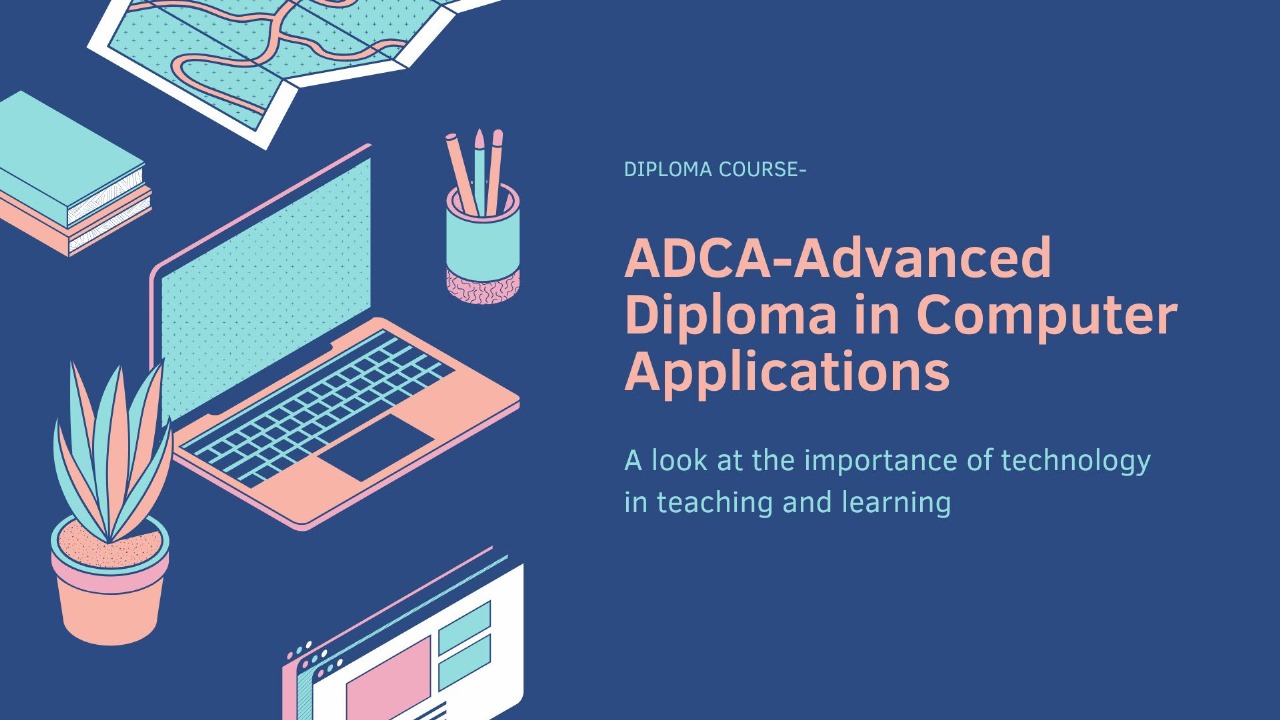Embarking on the journey of an Advanced Diploma in Computer Applications (ADCA) is an exciting step toward gaining practical knowledge and skills for the fast-growing IT industry. The program offers students the opportunity to dive deep into the world of computer applications, programming, networking, database management, and web development. While the course can be demanding, it prepares students to become proficient professionals in various areas of IT. So, what can an ADCA student expect in their daily routine? Let’s take a closer look at a typical day in the life of an ADCA student.
Morning Routine: Starting the Day with Focus
For most ADCA students, the day begins early, especially when attending morning classes. A typical ADCA curriculum includes a blend of theoretical lessons and practical hands-on sessions. Students often need to prepare in advance to make the most of their learning. The first few hours of the day are dedicated to lectures where foundational topics are covered, including:
- Programming Languages: Students dive into coding languages like C++, Java, or Python. Early classes tend to focus on understanding the syntax, data structures, and basic algorithms.
- Database Management: The basics of database design, relational databases, and SQL queries are often discussed in the morning sessions.
- Mathematics for Computing: Many ADCA programs also include foundational math courses that help build the logical thinking required for programming.
To stay on track, it’s essential for students to prepare ahead of time by reviewing notes from previous classes and completing any pre-reading or assignments.
Mid-Morning Break: Networking and Refreshing
After a couple of hours of intense study, students typically take a short break. During this time, many students engage in discussions with their peers or professors, ask questions about difficult concepts, or simply relax. Networking with fellow students can also be a productive activity, as it helps build connections that might later lead to collaborative projects or even job opportunities.
This is also a good time for students to review any challenges they might have encountered during the lecture and seek guidance. For example, if a student is struggling with a coding concept or a complex algorithm, they may take advantage of their network of peers to clear up any confusion.
Afternoon Sessions: Practical Work and Lab Sessions
In the afternoon, the schedule usually shifts to more practical work. This can include:
- Lab Sessions: Many ADCA programs incorporate practical sessions where students can apply what they’ve learned in a simulated or real-world environment. Whether it’s writing code, designing databases, or testing software, these sessions are crucial for honing practical skills.
- Project Work: Some students might be working on group projects or individual assignments related to the course material. For example, students might be tasked with creating a simple website, building a database, or developing a small software application. These projects are vital in reinforcing the skills learned during lectures.
During these hours, students might face challenges in applying theoretical knowledge to practical tasks, which is where their problem-solving and critical thinking skills come into play. While coding or debugging may take up a large chunk of time, the satisfaction of seeing a program run successfully is often the reward.
Late Afternoon: Self-Study and Assignment Completion
The late afternoon is typically reserved for self-study, as students work to complete assignments and revise for upcoming tests. This is the time to focus on:
- Homework and Assignments: ADCA students often have assignments that test their practical knowledge. These assignments could be coding tasks, database queries, or creating website layouts. It is essential for students to submit their work on time, as assignments are a large part of the assessment process.
- Researching and Reading: Staying up-to-date with new technologies and industry trends is vital for ADCA students. While the curriculum covers key topics in computer applications, students should also make time to read industry blogs, research papers, and books that expand their understanding of the field. For instance, understanding emerging trends in mobile app development or cloud computing can give students a competitive edge.
Students who are able to manage their time effectively can avoid last-minute cramming and reduce the stress associated with deadlines.
Evening: Reflecting on the Day’s Learning
As the day winds down, students often take some time to reflect on what they have learned. This can be a solitary activity or something done in study groups. Many students prefer reviewing their notes or making flashcards to help reinforce key concepts. Some prefer revisiting difficult topics to ensure that they understand them thoroughly.
In the evenings, students might also take a break from academics to relax and engage in extracurricular activities. For example, participating in student clubs, sports, or other social activities can help students maintain a healthy work-life balance. It’s important to unwind and clear the mind after a day of intense studying.
Weekend Learning: Group Projects and Extra Practice
Weekends are typically when ADCA students can focus on longer-term projects, team collaborations, or self-paced practice. Group work becomes especially important as students prepare for final assessments or presentations. Group projects often simulate real-world scenarios where students must work together to create solutions, which is a crucial skill in the IT industry.
In addition to group work, students can take advantage of weekends to practice programming on coding platforms like Codecademy or LeetCode, test out new software, or even attend webinars and workshops that enhance their technical knowledge.
Skills Development Beyond Academics
While the daily schedule primarily revolves around academics, ADCA students are encouraged to develop a wide range of skills outside the classroom as well. These skills include:
- Soft Skills: Communication, teamwork, and leadership skills are essential for success in any professional environment. ADCA students often develop these skills by collaborating with peers on group projects, presenting their ideas, and participating in discussions.
- Problem-Solving and Critical Thinking: A core component of the ADCA program is developing the ability to analyze problems, break them down, and implement solutions. These skills are crucial in IT and will benefit students throughout their careers.
- Industry Networking: Networking with industry professionals, alumni, and professors is vital for gaining insights into the field, finding internship opportunities, or securing jobs post-graduation.
What to Expect After Graduation: Career Opportunities
By the time ADCA students complete their coursework and graduate, they are well-equipped to pursue a range of career opportunities. Graduates can work in positions such as:
- Software Developer: Many ADCA graduates enter the software development field, where they work on creating applications and programs for various platforms.
- Web Developer: With expertise in web technologies, graduates can specialize in developing websites and web-based applications.
- Database Administrator: ADCA students with a passion for databases can work as database administrators, managing and securing data for businesses.
- IT Support Specialist: Many ADCA students go into IT support roles, helping organizations maintain their technology infrastructure.
The ADCA full form, which stands for Advanced Diploma in Computer Applications, is a program that provides a solid foundation for these careers, equipping students with the technical expertise and practical experience needed to excel in the IT industry.
Conclusion
The life of an ADCA student is both challenging and rewarding. From attending lectures and completing assignments to working on hands-on projects and developing technical skills, every day brings new opportunities for growth. While the path can be demanding, the knowledge and skills gained through the ADCA program will serve as a strong foundation for a successful career in IT.
Whether you’re interested in web development, software engineering, database management, or another area of computer applications, the ADCA program offers you the tools needed to excel. It’s important to stay motivated, manage your time effectively, and continuously improve both your technical and soft skills. As you progress through the program, the journey becomes less about overcoming obstacles and more about mastering the tools and knowledge that will shape your future in the tech world.
FAQs
- What is the ADCA full form? The ADCA full form is “Advanced Diploma in Computer Applications,” a comprehensive course that covers key topics in computer applications, programming, and IT.
- How many hours do ADCA students study each day? The number of hours varies depending on the student’s schedule, but most ADCA students spend at least 5-6 hours a day on academic work, including lectures, practical sessions, and assignments.
- Can I work part-time while pursuing an ADCA? Yes, many students work part-time while studying for an ADCA. However, it’s important to balance work with study commitments to ensure academic success.
- What skills are developed during an ADCA course? ADCA students develop technical skills in programming, database management, and web development, along with critical soft skills such as problem-solving, communication, and teamwork.
Also Read
- ► Why the Daman Game is Gaining Popularity in Modern Times?
- ► Buy the best toupee for men at a reasonable cost for a handsome look
- ► What Sets Our Dissertation Writing Services Apart?
- ► Is Advanced Python Learning Really Beneficial?
- ► The Versatility and Appeal of Custom Die Cut Sleeve Boxes
- ► Understanding Nitazoxanide: Chemical Synthesis & Benefits
- ► Why a Cheap Dedicated Server is Ideal for Small Businesses and Startups?
- ► Why Spider Hoodies Are Taking Over the Streetwear Scene
- ► The Role of an IVF Specialist Doctor in Fertility Treatment: A Comprehensive Guide
- ► Flu in Dubai: What You Need to Know
- ► Luxury Meets Convenience: Fendi Online Shopping in India
- ► Discover the Top 3 Online Law Assignment Help Websites in Australia
- ► How to Prepare for Your Initial Consultation at an IVF Center?
- ► The Science Behind RAD-140: How It Works in Your Body
- ► What Safety Features Do Bulk Fuel Delivery Trucks Have?




